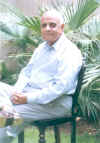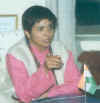|
|
the-south-asian.com January 2003 |
||||
|
JANUARY 2003 Contents Swami
Agnivesh & Music Ustad
Amjad Ali Khan Heritage
Books 'India
in Slow Motion' Serialisation
of 'Knock at every alien Events South Asian
Events in Lehngas - a limited collection Books
|
|
||||
|
Page 1 of 3 CORRUPTION - WHOSE MONEY IS IT ANYWAY? by Isidore Domnick Mendis The Berlin-based Transparency International ( TI ) has bracketed three South Asian nations among the world's most corrupt . Of the 102 countries surveyed, India is ranked 72, Pakistan [77], Nigeria [101] and Bangladesh 102…(the most corrupt). Are the relevant governments concerned?
Hush money, graft, bribe, sleaze …… call it by any name but the meaning is just one - corruption in public life. The dirty 'C' word today is synonymous with the functioning of all government offices that deal with the public. People are coerced to pay over and above for a service, which they are legally bound to receive. A new study by Berlin-based Transparency International ( TI ) brackets India with some of the world's most corrupt nations. Of the 102 nations surveyed in 2001, India is ranked 72, Pakistan [77], Nigeria [101] and Bangladesh 102---the most corrupt. The Corruption Perception Index (CPI) for India is 2.7. The index relates to the degree of corruption among public officials and politicians as perceived by business people, academicians and risk analysts. It ranges between 10 [most clean & transparent] and 0 [most corrupt]. Three of the world's cleanest nations are Finland with the CPI of 9.9, Denmark at 9.5 and New Zealand at 9.4. Canada ranks 7th. with a score of 8.9, England is 13th. at 8.3, USA 17th at 7.6, and Germany 20th at 7.4. Among the organisations that are taking up the issue of corruption in India and challenging and fighting it are Tranparency International (India), Chetna, and Parivartan.
Transparency International (India)
"Transparency International study is not at all surprising as some of the most significant legislations have not yet been passed. The Lok Pal Bill, declaration of assets by politicians, auditing of accounts of political parties, speedy trial of erring politicians, forfeiture of illegally acquired property and many other such legislations are in a limbo," says Admiral R.H. Tahiliani, former Governor and Chief of Naval Staff and now chairman of Transparency International [India] . Tahiliani's utterances are buttressed by the fact that political leaders are not willing to talk on the subject of corruption. Repeated attempts at getting in touch with Arun Shourie and Manmohan Singh---two of the most upright people in politics---drew a blank with the personal assistants of both saying their bosses were not interested in talking on the subject of corruption. According to the study the main breeding ground for corruption is the Indian political system, which has been supported wholeheartedly by the bureaucracy. Corruption, says the report, has reached such gigantic proportions because the electoral system is such that it requires sacks of money. " When the bureaucrat sees that the politician is corrupt then there is no fear. Yatha Raja Tatha Praja [ what the king does, so do the people]. If the king is corrupt the population too will be corrupt," says Tahiliani. According to the TI study there are perceptible linkages between poverty and corruption. " If the political leadership is serious in tackling poverty as it professes, it has to deal with corruption first," feels Admiral Tahiliani. Many academicians say that socialism is the fountainhead of corruption in India. Since independence the state has had a say in everything If one wanted to start an industry one had to get a license, if one wanted to close it one needed a prior permission. If one wanted to increase production one had to inform the concerned ministry. It was the licence Raj that became the breeding ground for corruption. Now , as the state begins easing its grip on basic necessities, corruption levels too are declining. Take, for example, the privatisation of power in Delhi. Under state control there were a spate of corruption charges against it. Now with privatisation, things are improving dramatically. However, says Admiral Tahiliani, " Corruption abounds in areas where citizens have to interact with the state departments like the police, health, housing, taxes, municipalities or licenses for starting businesses."
|
|||||
| Copyright © 2000 - 2003 [the-south-asian.com]. Intellectual Property. All rights reserved. | |||||
| Home | |||||


